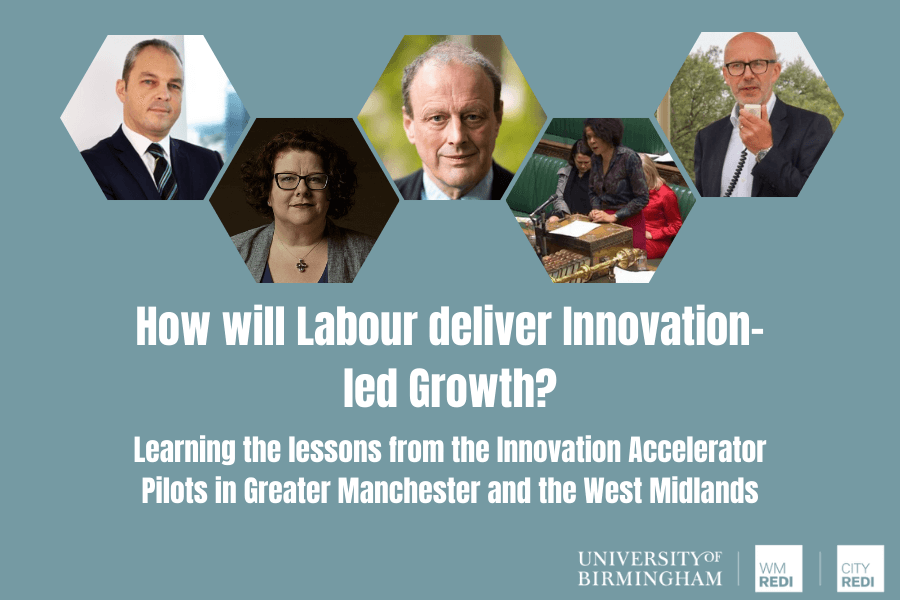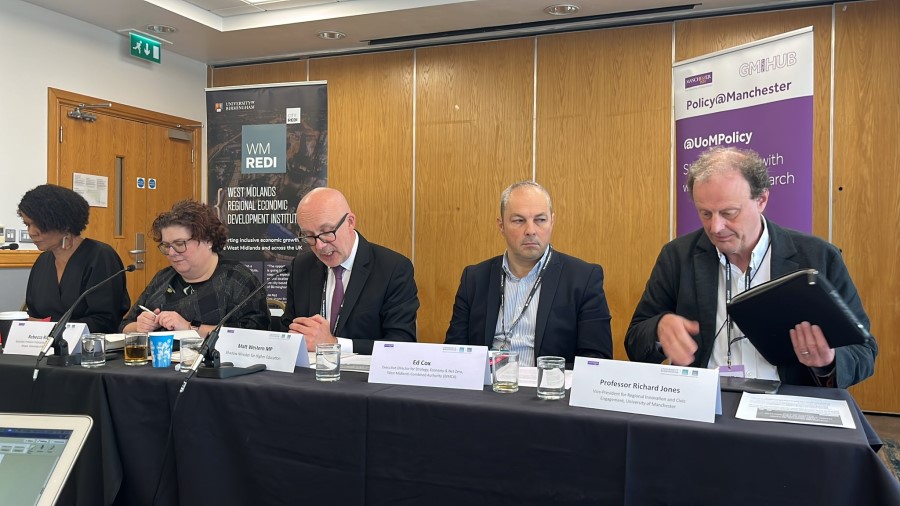On 9th October, City-REDI / WMREDI, University of Birmingham hosted a fringe event at the Labour Party Conference on how to accelerate placed-based growth and innovation. Rebecca Riley and Steve Barwick reflect on the key points discussed at the fringe event.
The event was chaired by Matt Western MP, Shadow Minister for Higher Education and the panel featured:
- Chi Onwurah MP, Shadow Minister for Science, Innovation and Technology
- Rebecca Riley, Associate Professor Enterprise, Engagement and Impact, City-REDI / WMREDI, University of Birmingham
- Professor Richard Jones, Vice-President for Regional Innovation & Civic Engagement, The University of Manchester
- Ed Cox, Executive Director of Strategy, Integration and Net Zero, West Midlands Combined Authority
- Daniel Zeichner, MP for Cambridge and Chair of the All-Party Parliamentary Group for Universities
What are the Innovation Accelerator Pilots
The innovation accelerators (IAPs) were set up earlier this year in Glasgow, Manchester and the West Midlands. The regions shared £100 million in funding to help pioneer a “locally-led” approach to research and development (R&D). Through 26 different R&D projects, the pilots will attract private R&D investment, create new jobs, boost regional economic growth, and develop the technologies of tomorrow.
The discussion at the fringe meeting aimed to cover the following questions:
- When should funding for existing IAPs be fully devolved to Combined Authorities rather than the current nationally controlled model?
- How and when to roll out the innovation acceleration process further across the UK?
- How can IAPs better respond to local demand?
- How can innovation be more clearly linked to the Levelling-Up / inclusivity agenda in addition to the growth and net zero ones?
- How and when should the Government commit to the innovation accelerator process long term?
A Bumpy Start
Setting up the IAPs got off to a bumpy start with each area taking a slightly different approach which reflected the governance and structures locally. However, by the end of the process, it was seen as a positive way forward on how to fund and organise innovation investment which benefits place.
Research by City-REDI and partners shows that there are limited levers at a local level to invest in economic development and growth, even with Combined Authorities.
Having a guaranteed allocation pot for places to collaborate around enables them to tackle some of the issues, this process enabled a change in working relationships between local and central government. The process enabled a collaborative, co-created approach to prioritising the interventions. It gave local policy makers a greater influence over the decision-making so local economic needs were better addressed.
“Place-based innovation-led growth is an absolute priority for me and the frontbench. Labour’s first priority mission is to create the highest sustained level of growth in G7. We believe science and innovation is key to growth and changing lives for the better ”.
Chi Onwurah MP, Shadow Minister for Science, Innovation & Technology
Funding local R&D
It is still difficult to align wider funding pots, due to inconsistency in government funding, timescales and outcomes. This is made worse by competitive tendering/bidding processes. Which, incidentally, the Treasury does not approve of and is discouraged in the green book, as processes should be fit for purpose and efficient.
It is very difficult to find match funding, especially in short timescales. The loss of regional development funds, European funds, reduction in local authority budgets (especially in economic development) and the inflation/cost pressures on businesses mean match funding is tight and difficult to find and align with the project ideas.
Local Government needs to develop structures to manage R&D funds:
“It was clear that the obvious way forward was to devolve funding. However, the response from civil servants and others was that the capacity to manage these funds was not present outside London. That is why Greater Manchester set up Innovate GM. This brings together 5 universities with the FE sector, businesses and the Combined Authority (which then brings in links to transport and health policy plus democratic legitimacy).”
Professor Richard Jones, Vice-President for Regional Innovation & Civic Engagement, the University of Manchester
Universities as Anchor Institutes
Universities are finding themselves in a position of stitching together funding to create programmes on behalf of partners. Universities deliver a large proportion of business support, especially around innovation, R&D and skills development on behalf of growth hubs. They develop the evidence base for investment as research functions have shrunk in Local Government. Yet their seat at the table can be ad hoc and transactional. Universities are key anchor institutions, employers and public service providers they have strategic roles to play.
“Universities do have a key role in driving forward this policy agenda. In particular, Labour sees the need for, and benefits of, partnerships between private sector and universities.”
Chi Onwurah MP, Shadow Minister for Science, Innovation & Technology
Making a success of the IAPs
Initial responses to the processes were positive, so how does any future government scale this up? £33m in innovation terms is small, so pots need scaling to at least £100m and need to be distributed to others nationally.
There also needs to be a long-term funding plan agreed and devolved budgets for innovation activity that is linked to wider funding portfolios i.e., wider academic and research council funding, business support, skills development, and net zero transition. Funding should look to the future of places, helping sectoral assets become more resilient to change and investing in high-risk new investments that give places new growth paths.
“As devolution “trailblazers” West Midlands and Greater Manchester will in future receive a “single settlement” – a pot of money for five years which can be locally allocated including to innovation. This is a very positive development.”
Ed Cox, Executive Director of Strategy, Integration and Net Zero, West Midlands Combined Authority
IAPS should address wider place need. Not just Gross Value Added (GVA), but jobs, well-being and net zero. The strategic case for investment should be about creating sustainable futures for places and investing in the local assets.
“To compete on innovation – to attract best minds and developers – it will be important that places provide excellent quality of life (transport/housing) as they will not be competing on pay.”
Daniel Zeichner MP and Chair of the APPG for Universities
“The challenge is getting inter regional connections to work so when an innovation scales up from design to production the manufacturing takes place in the UK. It is not enough for University R&D to earn 1% from its intellectual property – the UK economy also needs the jobs and growth from manufacturing the end product.”
Professor Richard Jones, Vice-President for Regional Innovation & Civic Engagement, the University of Manchester
Read the minutes for the fringe meeting.
View our blog about the Conservative Party Conference fringe meeting – Accelerating Place-Based Growth through Innovation: Lessons Learnt from Glasgow, Greater Manchester and the West Midlands.
This blog was written by Associate Professor Rebecca Riley, Interim Co-Director, City-REDI / WMREDI, University of Birmingham and Steve Barwick, Political Consultant.
Disclaimer:
The views expressed in this analysis post are those of the authors and not necessarily those of City-REDI or the University of Birmingham.




